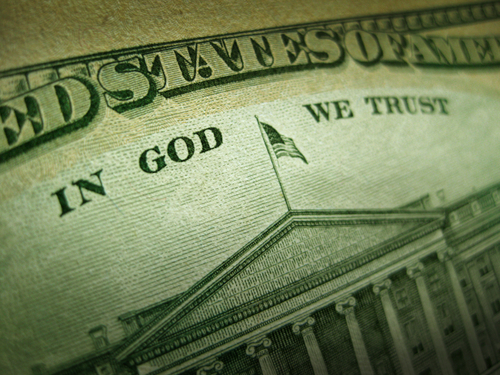Last week, Michael Newdow wrote a piece for this site about a new approach he was using to get “In God We Trust” off our money. In short, it used the Religious Freedom Restoration Act (RFRA) against the government, saying they didn’t have a good enough reason to burden atheists with the religious phrase.

Since then, there have been a few updates to the story.
1) ThinkProgress’ Jack Jenkins spoke with Newdow to get more details about his approach:
This potentially gives Newdow at least two new options for getting the term removed from coins and bills. First, he could claim that atheism is a “religion” unto itself, legally speaking, and thus deserving of exemption under RFRA. This may sound far-fetched, but there is already legal precedent for granting atheists the same protections as religious Americans: last October, a federal district court in Oregon issued a preliminary ruling that regarded secular humanism as “a religion for Establishment Clause purposes.”
Alternatively, he could corral plaintiffs whose religious beliefs are implicitly spurned by the phrase. Newdow cited the example of a devout Jewish man — who he said may become a plaintiff in his case — that ascribes to a specific strain of Judaism that restricts the use of the word “God” out of respect for the divine.
2) Jessilyn Justice at Charisma says a Newdow victory “could trigger an End-Times economy“…:
Newdow’s efforts have profound spiritual implications. Money and spirituality are heavily intertwined, says eschatology professor and prolific author Paul McGuire.
…
McGuire points to one of the founding theories of atheism, Darwin’s theory of evolution, and Space Odyssey co-author Arthur C. Clarke to connect atheism, money and the occult: Science is magic. To remove God from the money would allow the occult to take over.
McGuire says the dollar bill is bursting with blatantly occult symbols, meaning the United States economic system is based on magic and sorcery opposed to logic and principles.
Thanks, Jesus… your followers always make sense.
3) Newdow also sent me this update on the case(s):
The idea to challenge the mandatory monetary inscriptions of “In God We Trust” primarily on the basis of RFRA has been brewing for many years. After the Supreme Court — last year in June and again this year in January — twice agreed unanimously that the words of that statute mean what they say (i.e., that government may not substantially burden any individual’s exercise of his or her religious views without first demonstrating a compelling interest and laws narrowly tailored to serve that interest), it became clear that the time is ripe to bring that challenge. Thus, preparations were begun.
We started seeking plaintiffs months ago, notifying individuals and groups about the planned litigation and the fact that we would be bringing it in the seven federal judicial circuits that have not yet ruled on the issue. When last week began, we were doing fairly well, although we still had not quite met our goal of at least ten plaintiffs (including at least two with children) in all seven circuits.
Then, in what turned out (in retrospect) to be a stroke of pure genius, we asked Hemant if he wouldn’t mind notifying his followers of the cases. Holy (or not) Smokes! By the end of the week, we had far surpassed our goals. In fact, I wouldn’t be surprised if we doubled in the few days after his post the number of plaintiffs we had found in the many weeks (or months) of previous efforts. What a gold mine!!
Anyhow, if anyone else still wishes to join, we will continue to accept both individuals and organizations for at least a week or so. For this litigation, I think “the more, the merrier” is an appropriate approach, especially in view of the fact that at least one Supreme Court justice has found it “telling that so little ire has been directed” at such egregious governmental endorsements of Monotheism.
We also still need attorneys to serve as local counsel in some of the circuits. Thus, if you are a lawyer willing to serve in that role, or if you know someone who may be so willing, please contact us at your earliest convenience. Lack of local counsel may turn out to be the biggest obstacle to our progress.
Meanwhile, thanks for all of the wonderful support!
Potential lawyers can contact Newdow right here.
I also asked Newdow what he thought of the Charisma piece. He replied:
I was going to tell you what I think about it. However, it then occurred to me that using the word “think” and an assessment of that article in the same email makes little sense.
Sounds about right 🙂
(Image via Shutterstock)



It’s Moving Day for the Friendly ..."
It’s Moving Day for the Friendly ..."
It’s Moving Day for the Friendly ..."
It’s Moving Day for the Friendly ..."